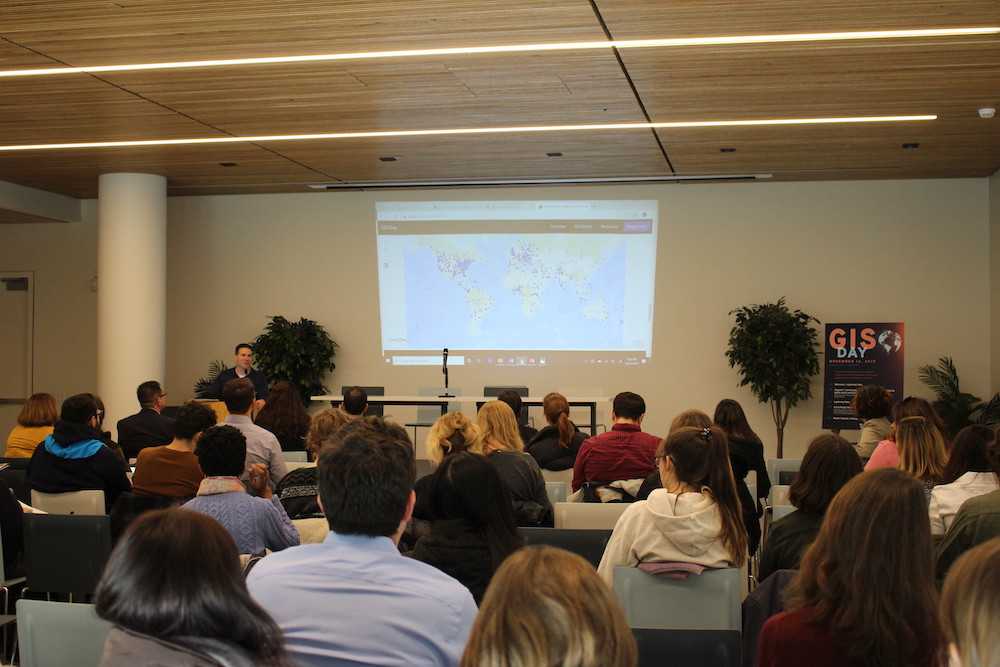Even with an undergraduate degree in Geographic Information Systems (GIS), Terra Luke initially found it challenging to secure a position in her chosen field. At a friends’ suggestion, she enrolled in Temple University’s Professional Science Master’s (PSM) GIS program in 2018. Just one month into the program, she was offered an internship-turned-full-time project management job with the Department of Public Property for the City of Philadelphia.
“Seeing that I was actively pursuing a higher education in GIS, the city thought I’d be a good fit,” Luke said. “Here I am, five years later, and I still absolutely love my job.”
Luke will be sharing her story in person at Temple University’s GIS Day — a nationally recognized day on which Temple holds a free, annual event that showcases global GIS innovation, keynote speakers, lighting talks, a GIS workshop and a jobs panel from 5:30 to 6:30 p.m. where you can see Luke speak. The event is a great place to learn more about Temple’s PSM in GIS, and the many ways to apply your graduate degree in the real world.
Since its launch in 2015, Temple’s one-year GIS graduate program, offered within the university’s Department of Geography and Urban Studies, has well-positioned its alumni to find jobs in the GIS and data science fields.
Broadly, GIS is a system of visually mapping and analyzing data in order to understand patterns and relationships in a geographic context. GIS is often used to solve complex, global societal and environmental issues across almost every industry, including disaster response, economic development and public health.
“There is just so much you can do with a PSM in GIS,” said Liz Janczewski, the program’s student services coordinator.

Case in point: While Luke found a career in the public sector, project managing the inventory and inspections of city-owned workspaces, fellow alum Mike Robbins ultimately took a role in the private sector as a GIS programmer building global crisis maps for Tesla Government Inc.
Robbins has an undergraduate degree in environmental science from Northeastern University, but after graduating in 2013, he had been working at a coffee shop, “not doing much.”
“Enrolling in the program spurred a radical shift in my life,” said Robbins, who, similarly to Luke, found an entry-level job just after completing his first course in the graduate program in 2018. He adjusted his schedule to take courses part-time so he could work full-time, and graduated in 2020.
Unlike Luke, Robbins tried on a few companies before landing his ideal job at Tesla Government, including roles at BAE Systems, the Great Neck Water Pollution Control District and the City of Yonkers. The program, and each subsequent job, he said, prepared him for his current role tracking crisis in countries all over the world.
“Ninety percent of my job today is done in Python,” he said. “I was always interested in coding, but assumed it was too hard to learn. I couldn’t have gotten the job I have now without two specific courses within the program: Spatial Database Design and Application Development. It provides an attainable way to either switch careers or get your first career rolling.”
During their tenure as grad students, both Luke and Robbins found value in attending GIS Day. This year, alongside Luke, Robbins will also be sharing his experience in the program and in the field, as a guest on the jobs panel.
“Enrolling in the program was transformative for me,” Robbins said. “Personally, it changed the course of my life.”
The program — and GIS Day — is a good fit for people who are interested in learning hard skills like creating maps and coding, as well as those who gravitate toward disciplines in the social sciences and humanities like political science, geography, economics and sociology.
“I love the way Temple runs this event,” Luke said. “It’s interactive and fun. It’s always fun to nerd out with other GIS people, but it’s also helpful to see what others are doing in the field because GIS is so broad. Students and interns get as much value out of it as professionals who are more established.”
Interested in attending GIS Day at Temple University on Nov. 15? Learn more and register at the link.







